Korean
War Hero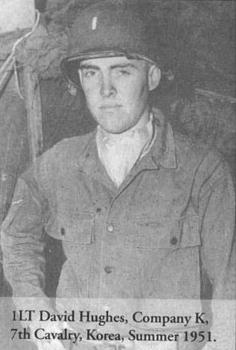
West Point Class of 1950 Graduate,
Lt Hughes, without benefit of Infantry Officer Basic Course, Ranger, or
Airborne training successfully fought and commanded a Rifle platoon and
company in the 7th Cavalry from November 1950 to December 1951, winning
the Distingished Service
Cross, Silver Star with OLC, Bronze Star w/V, Purple Heart, and Combat
Infantry Badge during periods of horrific combat in which he lost all his
officers and 85% of his men while still accomplishing his missions.
Selected by Bill McWilliams '55 as the
quintissential Korean War Class of 1950 grad in serialized 'Once More into
the Fire' series in West Point's
Assembly Magazine Jan-Mar 1998.
Winner of the 1951 Freedom Foundation,
Valley Forge Award for 'Outstanding Achievement in Bringing about a Better
Understanding of the American Way of Life" from his 'Letters from Korea'
expressing idealism and pride in service during the darkest days of the
war. Letters
read over national radio, printed in large numbers of newspapers, and read
into the Congressional Record by Senator Eugene Milliken.
Narrative writings from Korea and several
years thereafter published in national publications, both civilian and
military. Throughout all his public writings over a lifetime, the virtues
of West Point and its ideals shines through. Hundreds of thousands of Americans
have been, and continue to be, influenced by his writings, speeches, and
Email messages.
Inspirational
Army Role Model
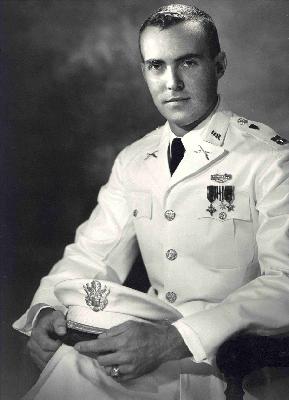 After
Korea, he served tours as a popular Instructor of Tactics, Fort Benning,
GA, and an Instructor of English at West Point 1955-1958 as a Captain.
He Influenced many cadets of the era by his inspirational presence as the
most highly decorated member of his class, while teaching the arts - and
singularly exemplifying the ideal of Soldier-Scholar West Pointer. As repeatedly
expressed in the online West Point forum and in Email today, he is remembered
and thanked by graduates, many of whom attained high rank and status. After
Korea, he served tours as a popular Instructor of Tactics, Fort Benning,
GA, and an Instructor of English at West Point 1955-1958 as a Captain.
He Influenced many cadets of the era by his inspirational presence as the
most highly decorated member of his class, while teaching the arts - and
singularly exemplifying the ideal of Soldier-Scholar West Pointer. As repeatedly
expressed in the online West Point forum and in Email today, he is remembered
and thanked by graduates, many of whom attained high rank and status.
Counselor
on National Politico-Military Policies
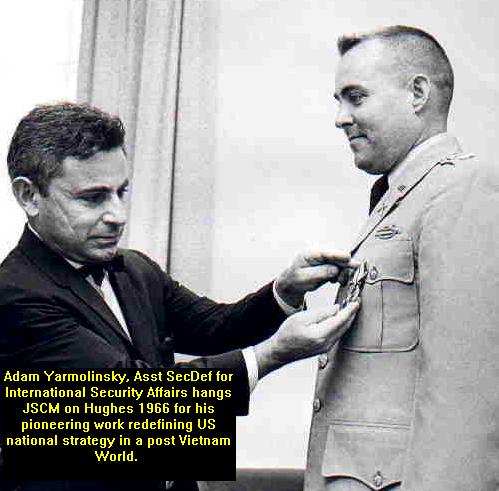
After years of successful staff and line
assignments typical for an Infantry officer, domestic and overseas, Hughes
was selected to advise, first, the Chief of Staff US Army, then the Secretary
of Defense on politico-military policies. Co-Author with later Gen Paul
Gorman, CINCSO, of a series of breakthrough and precient studies that redefined
the nature of future wars and their relationships to the national American
character and values. Author of key portions of 1966 State of the
Union address by President Johnson. Principal author of Sec McNamara's
landmark speech before the American Newspaper Editors May 18, 1966 which
was acclaimed world wide for its vision 'beyond Vietnam' about America's
place in a violent world and the changing role of America's military
in the future. A vision being played out today. Hughes was awarded
the Joint Service Commendation Medal by the Secretary of Defense
for his innovative work.
A year of studies followed at the Army
War College, 1966-67 where ideas born in the Pentagon were fleshed out
and printed in the Naval Institute Proceedings among other professional
journals.
Back
into Battle - Viet Nam 1967
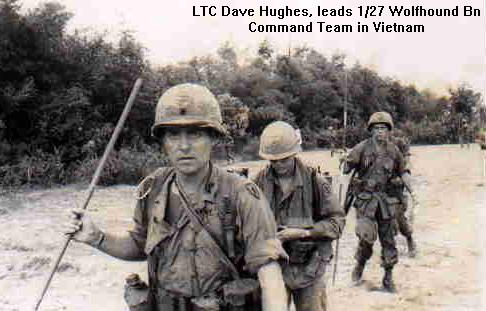 1967-1968
saw now Lt. Col. Hughes commanding a Battalion of the 25th Division in
Viet Nam, successfully performing air mobile operations during which he
earned a third Silver Star , 14 Air Medals. During the last half of his
tour he was selected by LtGen Weyand, IIField Force to analyze and deal
with the press, and brief the most senior military commanders and staff
about their misconceptions about the actual military impact of the Tet
Offensive. He was awarded the Legion of Merit for this work. 1967-1968
saw now Lt. Col. Hughes commanding a Battalion of the 25th Division in
Viet Nam, successfully performing air mobile operations during which he
earned a third Silver Star , 14 Air Medals. During the last half of his
tour he was selected by LtGen Weyand, IIField Force to analyze and deal
with the press, and brief the most senior military commanders and staff
about their misconceptions about the actual military impact of the Tet
Offensive. He was awarded the Legion of Merit for this work.
Launching
the Volunteer Army
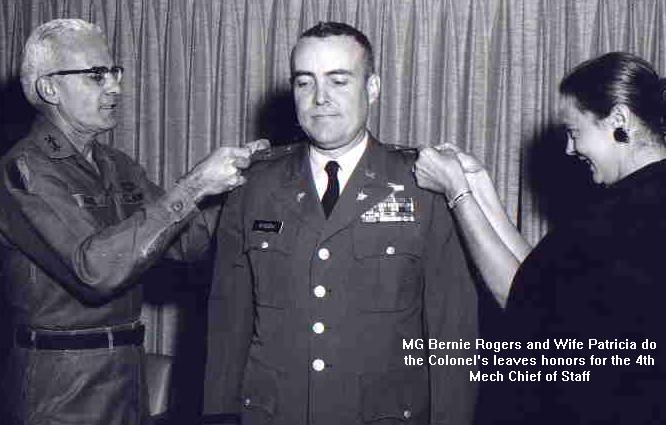
Upon returning to the United States, Hughes
was sought after to bring his extensive combat experience, coupled with
his high degree of innovative and 'out of the box' civil-military skills
to a military post, Fort Carson, which became a major test bed of the efforts
to transition to a wholly Volunteer Army and make the hitherto lightly
regarded post a pioneer of the future Army. While there he commanded a
mechanized Infantry battalion, was G-3, and was selected by Maj General
Bernard Rogers over all more senior to become the first Chief of Staff
over both the Division and Post, with the widest span of control of any
Colonel in the US Army. Of great significance was the effort during the
very difficult times for the Army (1968-73) to influence both the national
press and launch the entirely Volunteer Army.
Declining to return to Washington DC and
the Pentagon, Hughes chose to retire after 23 years commissioned
service, and was determined to participate in the coming of the Information
Revolution and saw the importance to the US for bottom-up, rather
than top (Washington) down societal change. He retired as a colonel
with a Legion of Merit award.
A
New Direction - Society and Telecommunications
And so Hughes became one of the earliest
American pioneers in using microcomputer and modem elecommunications to
make local communitites - societies work better economically, socially,
politically, and culturally. But he brought the enormous education,
military and military-civil experience of West Point and his first 45 years
to bear on the problems of society in a troubled and changing country.
Hughes swiftly became known world wide
for his pioneering in the use of the new tools, inventing grass roots neighborhood
systems that empowered ordinary small business, small organizations, and
small and remote towns with global connectivity. Starting in 1977, long
before most Americans knew modems and personal computers existed, he was
operating, in business for himself, the earliest computer communications
service in Colorado Springs.
Roger's
Bar - World's First Electronic Democracy
Using the most primitive - by today's standards
- personal computing tools, he created the first free, modem dial-up, electronic
democracy bulletin-board system in the world. It soon challenged and altered
the way local city wide politics was conducted. It was based on his profound
understanding of the part person to group 'communications' played in the
uniquely American political process.
It was colorfully named 'Roger's Bar' after
a local neighborhood watering hole which is a center of local political
discussions. Within 5 years the world's press had beaten a path to Hughes'
home to report on, and encourage others to adopt an entirely new model
of 'electronic democracy' - a model which could be adopted in any small
town in America. The New York Times, Wall Street Journal, Germany's Stern
Magazine, Japan's Yomura Shimbun newspaper- with 21 million daily readers
reported in the early 1980's on his work, which was emulated world wide.
The McNeil-Leher News Hour on PBS explored his success. WGBH Boston incorporated
his practical innovation into a NOVA national television series. The Electronic
Frontier Foundation founded by the greatly successful Lotus spread sheet
company founder Mitch Kapor gave him the 1993 Pioneer Award where he shared
the dias and recognition with two giants of the computer revolution Vint
Cerf, the father of the Internet, and Paul Baran the inventor of packet
switching, first used by the Defense Department.
1993's
Most Recognized Personality on the Internet
He has been in demand as a keynote speaker
and participant in both highly technical and general public policy forums
world-wide ever since. Wired Magazine, the avante garde flagship publication
of the Information Age called him, in 1993 'The most known personality
on the net in the world.' While being a partner in an Internet communications
company from 1984, he did large amounts of his work voluntarily, without
compensation. And used his publicity as a effective tool to get his message
out about 'community networking' long before public interest foundations,
or mass media even knew what the term 'internet' meant.
While it was his pioneering that struck
people, given his age - over 60 by this time - he was always introduced
as a West Point graduate, who had fought the nations wars before blazing
new trails on the Electronic Frontier in much the same way as the Army
blazed trails in America's move westward.
Community
Leadership in Colorado
Hughes used his extensive background to
lead, voluntarily for 10 years - 1976 to 1986, the comprehensive and novel
revitalization of an entire run down historic neighborhood of Colorado
Springs, called 'Old Colorado City.' Using both his technologies and early
grasp of the return of the significance of 'small' business to communities
long before the idea was popular, and his 'community leadership' skills
he is credited for giving business opportunities to hundreds of small business
persons, making the run down residential 'westside' of Colorado Springs
highly desirable to live in, achieving the goals of the City of Colorado
Springs there, and unified the entire project by researching and appealing
to its unique History as a frontier town. The project has been cited by
the Small Business Administration as one of the most successful implementations
of several of their programs, the Governor of the State used it to supportColorado's
'Main Street' project in scores of towns and cities in the later 1970s,
and it greatly assisted the then Mayor of Colorado Springs, a 1951 West
Point graduate, win for the city the All American City Award. The
current Mayor and City Council of Colorado Springs have recently honored
Hughes for that, and his pioneering use of computer technology to improve
a part of the city, by formally renaming and marking in Bronze a public
right of way in Old Colorado City 'Dave Hughes Cyberpath.'
He has remained involved and influential
in City public affairs, and for 20 years has helped build up the Old Colorado
City Historical Center, in which the vision of an ex-graduate, the Territorial
Governor of Colorado in 1862 helped stop a Confederate effort to capture
Colorado Gold during the Civil War. Hughes has educated the public on this
little known, but decisive 'Little Gettysburg of the West' episode involving
a West Pointer. Hughes has also donated money and expertise so that
the History Center has such an impressive, wirelessly connected, web site,
that the national television History
Channel has named it one of their preferred national sites. Always Hughes
accomplishes traditional purposes with novel applications of future technologies,
at the lowest possible cost.
Electronic
Distance Education Pioneer
During this period Hughes, extremely concerned
that American education, particularly early education K-12 in remote and
rural areas adapt to the new modes of teaching and learning, focused part
of his effort on developing modes of distance education - again decades
before it was being practiced by universities. Some scholars credit Hughes
with teaching the first college courses in the world via public telecommunications
networks.
His landmark 'Electronic English' course
for Colorado Technical University in 1983, whose remote students included
the Lt. Governor of Alaska, and persons as far away as Australia. His success
at this led to it being emulated widely. And in 1990, he was approached
by faculty and researchers of MIT who were concerned about the state of
education in math and the sciences. In a series of nationally celebrated
experiments, teamed up with theoretical physicist Dr. George Johnson of
MIT, Hughes designed courses in the Math and Science of Chaos, which were
delivered - in one case - to a virtual classroom of 40 high school students
scattered from one-room school houses in Montana, through small schools
in Cody, Wyoming, to include large schools in Colorado Springs such as
Air Academy High. Once again he applied his military-honed ability to go
from the most abstract and theoretical application of the new information
tools, in the public interests of the US, to the most practical and
grass roots uses in the least sophisticated or well endowed places in America.
This work culminated in his doing work for the Congressional Office of
Technology Assessment on request of then Senator Al Gore's staff on how
the Internet could be used to improve the quality and relevance of American
Education. And upon the White House staff's urging, Hughes has testified
before the Federal Communcation Commission - FCC - on how even newer technologies
can be used for more effective education.
Listed
in 100 Most Influential of the Computer Age
The most read technical publication in
California, Microtimes Magazine named Hughes one of the 100 most influential
individuals in the Computer Age, six times between 1990 and 1996.
At least two Doctoral theses have been
pursued (Annenberg School of Communications and Nova University) examining
Hughes theories of how public interests can be best served by grass roots
up digital telecommunications.
Walking
Point - Defending the Military on the Well
1984 saw the first appearance of an influential
online computer conferencing service in the Bay Area of California called
'The Well' It was, and still is, used by up to 10,000 subscribers who can
be classed as extremely liberal, highly Silicon Valley technical, and many
of whose members have been frankly anti-military. They include reporters,
editors, and writers from Time Magazine, the Washington Post, People, US
Today, Newsweek, New York Times, National Public Radio, MSNBC and score
of other regional or national publications and media. Col (R) David Hughes
has been a very high profile guest
member of that community since its beginning. He has been only one of less
than 25 members who had serious military service, much less combat experience,
and for 14 years has engaged this influential
sector several times a week in extended debates on military and foreign
policy, the nature of the US Military and what it takes to maintain readiness,
the values and value of West Point and our other Military Academies and
interpretations of high profile military news items from wars such as Desert
Storm and Yugoslavia, and military sex scandals. In spite of being
attacked frequently for his military and West Point supporting views he
has won the respect of thousands of influential information age citizens
for what he represents, and in turn has not only educated thousands of
citizens about the US Military, but challenged in interactive ways, hundreds
of false rumors, tortured dismissals of the US Military, and poor or simply
sensationalist reporting about things military. In effect Hughes has been,
electronically, right in the camp of the highest concentration of the anti,
or ignorant of, military, and carried
on the public information war for the things he holds dear about West Point
and honorable military service.
Early
Advocate of Spread Spectrum Radio
In the early 1990's, anticipating the spread
of the Internet accross the world, but having worked with such difficult
projects as the connecting up of 114 one-room schoolhouses in rural Montana,
where continuous conmmunications costs done in traditional ways can get
prohibitive, he turned to, and quicky mastered the most advanced form of
digital communications - spread spectrum wireless which had been used since
the early 50's for secure military communications and began to apply it
to the problems of linking very remote communitites and their schools to
the Internet at high speeds at the lowest possible costs.
National
Science Foundation Seeks Hughes
The National Science Foundation, since
1984 has called upon Hughes 5 times to accept substantial grants to pioneer
the model of wireless connectivity to the Internet from remote schools,
businesses, governments, and people. This has included assistig the
Mongolian government connect up its institutions in UlaanBataar to the
Internet in places that local PTT's (telephone companies) are totally unable
to provide digital connectivity. This work publicized by MSNBC television
has attracted global attention - and Hughes has been solicited for advice
and consultations by representatives of scores of 3d world countries -
Bangladesh, India, Pakistan, Uganda, Venezuela, Mexico, Cambodia, Puerto
Rico, and Turkey on how to employ low cost, solar powered in many cases,
secure, and non commercial digital wireless to connect up places which
will never see the wired infrastructure of the United States.
His $400,000 NSF Project, 'Wireless Field
Tests For Education' which assisted both urban, rural, and rural poor schools
in Colorado, New Mexico, and Montana between 1995-1999 has been emulated
by dozens of states, and the $1.5 Billion Texas Infrastructure Fund designed
to assist Texas schools, libraries and health centers become connected
has called on him repeatedly to advise them and show applicants for those
funds how to use both terrestrial spread spectrum and satellite services
to serve at affordable rates the smallest entities in that very large,
very rural, state. Much of Hughes work takes him to the places which are
avoided by corporate America because there are only high costs and low
returns from such places.
Scientific American and the MIT Press have
both solicited treatises from him, and both, in April 1998 and May 1999
have published his work.
Wired
Magazine - 1 of 25 Most Innovative World Leaders
In 1998 Wired Magazine named Hughes one
of the 25 most innovative 'Wired' leaders in the world. He shared that
distinction with billionaire George Soros who funded telecommunications
in ex-communist countries, and Steve Jobs of Apple Corporation. His citations
clearly identified Hughes as a West Point graduate and highly decorated
military warrior in his younger years. This has reflected favorably on
West Point and its ability to produce, not only leaders, but men who have
a sense of 'public interest' apart from 'private interests' (amassing fortunes
or building companies via technology) for the betterment of mankind through
technology.
Reporters, astounded at how much energy
he has shown and just how far his reputation has spread without him being
the head of, or backed by any large organization, have helped him calculate
just how much he has been 'online' over the past 20 years during the infancy
of the Information Age. They calculate he has read over 200 million
words online, and produced over 8 million of his own. Which accounts in
part for his very wide, and global, influence. And while he is known colorfully
as 'The Cursor Cowboy' his reputation is always accompanied by the knowledge
that he is a "West
Pointer" and exhibits the values it represents.
For 2 years since becoming active in the
West Point graduates Web based online 'Forum' he has brought his extensive
and unprecedented - among graduates - knowledge of Internet communications
to educate and advise both the sponsors of the growing online service to
graduates (15,000 of 40,000 living graduates use the service now) on how
effective interactive telecommunications can be used to better educate
Americans, the Congress, the Press and Media, about West Point and its
current importance to the nation. He has directly assisted some graduates,
using the online medium. Example - he became a Faculty Advisor to an active
duty Major, graduate, attending the Romainian Defense College as he prepared
his graduate thesis. But performing this function entirely online over
months of time.
No
Gun Ri
Dave Hughes used
his extensive networking skills and experience as soon as the Associated
Press broke the sensationalist story in October of 1999, of a so-called
'massacre' at No Gun Ri, Korea, in July 1950. Although Hughes, then
a 2d Lt, was not yet in the 7th Cavary in Korea - he joined the Regiment
a few months later along with large numbers of his classmates - he knew
all the officers named in the AP Story, knew their writings on Korea, was
an active member of the Korean Chapter, 7th Cav Association, and knew every
veteran that the AP interviewed. He was skeptical from the beginning that
the incident occured the way, and to the scale, that AP reported.
Hughes immediately
went online, to both 7th Cav veterans, officers and men, rapidly did his
'own' research, and saw not only holes in the story, and doubt about its
most outspoken veteran - Ed Daily - but also the damaging effect the repeated
bad publicity was having on the efforts, 50 years later, to honor all the
veterans of the Korean, 'Forgotten' War. Not only did his online
skills help him investigate, he also started a very successful campaign
to write, and circulate, Op Ed pieces on the military context of the early
days of that war, and why the lack of readiness of the troops because of
Congressional and Administration actions, led to the terrible problems
the US Army had when thrown into Korea. Conditions which led to the killing
of some civilians at No Gun Ri.
By circulating
his Op Ed pieces to over 100 of his West Point Classmates, and over 300
graduates on the West Point Forum, he leveraged his one-man efforts as
they in turn, sent his powerful writings to many publications. Newspapers
all over the country - picked up his 'The Harder Lessons of No Gun Ri'
which even made it to the Chief of Staff of the US Army's desk who passed
it to the head of the Army Investigative Team, LTG Akerman, who said 'It
was the best thing written yet on No Gun Ri.' Hughes also found,
by feedback, many veterans, including a JAG officer in the 1st Cavalry
Division, who was there, and whom, on Hughes recommendation were interviewed
by the DA IG Team.
Hughes words
were circulated so widely that media, from the New York Times, Baltimore
Sun, Rocky Mountain News, and CBS Television interviewed him, and he in
turn pointed them to others who should be interviewed. In fact the only
reason that the 50th Reunion of the Class of 1950 at West Point was covered
by the media - and especially CBS ews, was from the online advocacy by
Hughes. It was very favorable national publicity for an Academy Alumni
event that is rarely ever covered by the press. In fact one Pulitzer
Prize winner for his book on Vietnam, David Halberstam, who is doing a
book on the Korean war, was put in contact by Hughes with large numbers
of West Point graduates from that war, whose views and experiences
are bound to find a place in his work.
All this online
activism contributed to the astounding finding by US News and World Report,
picked up by other media, that the chief witness and participant to the
'massacre,' one Ed Daily, was a complete fraud. Which Hughes then
was able to circulate all across the country in a much reproduced piece
called "What Did Not Happen at No Gun Ri." In short, using
his networking skills, his combat experience in the 7th Cav, his stature
with Integrity, as a West Point graduate, he help a great deal in educating
the American public on the more profound, rather than just sensationalist,
lessons of No Gun Ri, the Korean War, and the actions by honorable men
there, including many West Point graduates.
He did all
this in a very short span of time, demonstrating by personal example how
one West Pointer can 'make a difference' in public opinion on matters military,
using the most advanced forms of Internet telcommunications, while still
running his Colorado company, and carrying out a heavy load of work for
the National Science Foundation. Other retired graduates, with some networking
skills, have learned from Hughes how they too, as grads, can make a difference
in educating the public which has become ever more distant from the US
Military.
Virtual
West Point
His most important contribution, as a graduate,
to the contemporary purposes of West Point has been to propose an imaginative,
very future looking, rich, large, and impressive 'Virtual West Point' project,
which may in the end cost more than $10 million (he has suggested sources
of funding). This idea, strongly endorsed by scores of graduates, will
put West Point on the global World Wide Web map in unprecedented ways,
so that the current 60 million Americans who are actively on the Internet
- including the tens of millions of potential school-age candidates for
admission, can 'visit' West Point electronically, with the full, rich,
and real-time graphical impact the premises makes on visitors, with real
time global internet 'broadcast' of public parades, athletic events, and
cadet activities that are the daily life at West Point. To present the
histories and accomplishments of graduates from the beginning of the Academy.
And, anticipating near term increases
in telecommunications capabilities, be able to present, online, feature
length documentaries and films, past and future that can capture the imagination
of Americans and inspire its youth toward
admission as cadets. As well as provide a true, interactive, dialogue forum
where the public and press can discuss all things military, and in large
measure make up for the widening 'knowledge gap' between Americans in a
volunteer Army age, and its own military services.
This proposal has been submitted
to Assembly Magazine for consideration by all graduates.
At 71, Hughes has just been awarded a $1
million grant by the National Science Foundation to pioneer, for the next
three years, the uses of digital wireless in support of biological scientists
in remote areas, including the Rain Forests of Puerto Rico, and the frozen
lake country of northern Wisconsin, and linking their sensors, and work,
not only to them, but to the Internet
and thus make hard environmental science available to both scientists,
students, and the general public as it is being created.
So Hughes is still pioneering, and can
be expected to continue to do so to the end of his life. |